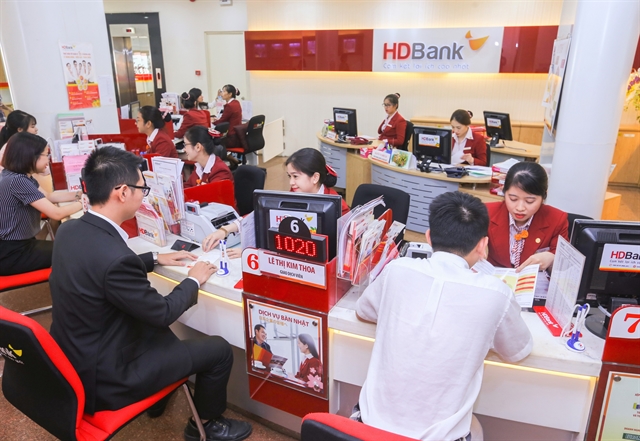 Economy
Economy


|
| At an HDbank transaction office. HDBank executives register to buy large chunks of lender’s shares as pandemic drags down prices. — Photo courtesy of the bank |
HCM CITY — Trần Hoài Nam, deputy general director of HDBank, has registered to buy 500,000 shares of his bank on the Hồ Chí Minh Stock Exchange between April 3 to 29 for investment, according to the exchange.
Nguyễn Hữu Đặng, a member of the bank's Executive Board and its General Director, and Phạm Văn Đẩu, its chief financial officer, are also completing registration procedures for buying a total of 1.5 million shares.
The bank’s major shareholder, Sovico, has also completed procedures to buy shares to increase its holdings.
Due to the impact of the COVID-19 outbreak, many stocks have seen their prices drop sharply and become very attractive.
HDB has strong fundamentals and high growth prospects. In 2019 the bank recorded profit before tax of VNĐ5.018 trillion (US$212.7 million), up 25.3 per cent from the previous year.
Its return on average assets (ROAA) and return on average equity (ROAE) were 1.8 per cent and 21.6 per cent. Its share is now trading at below book value.
Over the years HDBank’s non-performing loan ratio has always been controlled at the lowest level in the industry: last year it was only 0.98 per cent.
In addition, earnings from services, especially bancassurance and credit card, which are considered to have more room for growth, will be new drivers of income growth in the coming time.
According to analysts at the HCM City Securities Corporation, the bank’s income from services too has much room to grow and will continue to enjoy strong growth. The bank is in the process of selecting bancassurance partners to expand in this promising sector. It has enhanced digital banking services to effectively exploit its large and diverse customer eco-system comprising over 30 million customers.
It reported positive performance in the first quarter of the year and strictly follows its plan for the year.
The bank has also paid great attention to community activities. For instance, it donated VNĐ10 billion through the Việt Nam Fatherland Front to support the fight against the COVID-19 pandemic, help people suffering from drought and saltwater intrusion in the Cửu Long (Mekong) Delta, donated 1,000 hospital beds to the HCM City Department of Health, and gifted health insurance cards to thousands of near-poor people across the country, among others.
Besides, it has earmarked a number of credit packages for customers amid the COVID 19 such as a VNĐ10 trillion package to provide loans to producers and corporates who supply goods and services to supermarkets to stabilise the prices of consumer goods and other essential items at flexible interest rates starting at 6.5 per cent per year.
It also announced a support package of VNĐ5 trillion for small and medium-sized enterprises and VNĐ3 billion for drug and medical equipment companies to contribute to the fight against the pandemic.
To ensure production and supply of rice for the country and to help enterprises and business households facing difficulties due to saltwater intrusion in the Mekong Delta, the bank has just launched a VNĐ1 trillion loan package for agricultural chains. It also has a preferential loan programme dubbed “Vay tiền phát lộc – 30 năm vàng” with interest rates reduced by 5 percentage points for enterprises, especially SMEs, to pay salaries to their workers amid the peak period of the pandemic.
It offers preferential credit to customers affected by the COVID-19 pandemic with interest rates cut by 2-4.5 percentage points.
Together with the credit packages, it has also launched the HDBank App with many improvements and utilities to enhance digital transactions to minimise cash usage and increase its own efficiency. — VNS